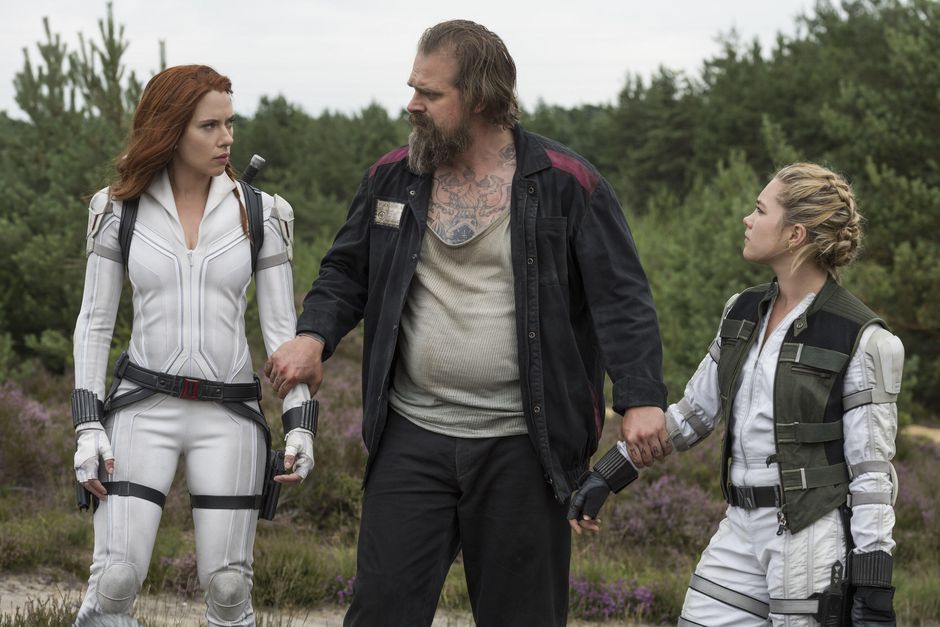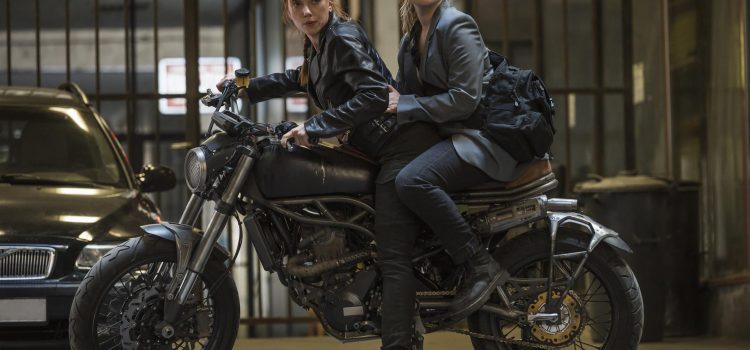By Lynn Venhaus
For those craving the Marvel Cinematic Universe on the big screen, “Black Widow” boldly arrives as a much-anticipated summer blockbuster event, checking off the usual boxes.
Black Widow (Scarlett Johansson), aka Natasha Romanoff, is a former Russian spy, now Avenger. In this stand-alone feature from the Marvel Universe, her complicated past and an unusual family dynamic collide in a globe-trotting mission pursuing a powerful KGB mind-controlling villain.
It’s the latest movie since the “Avengers: Endgame” finale in April 2019, although MCU has been busy delivering content on streaming services for the home screen that is far more original.
On the surface, this prequel-origin story has the appeal of women getting the job done instead of the plethora of standard-issue alpha males– they hold their own as intense fighting machines, using their brains along with their brawn.
Frequently outfitted in a snazzy black leather cat suit, the lithe Scarlett Johansson carries the day as lethal weapon Natasha, trying to vanquish all connections to the nefarious Red Room program. She trusts no one and can’t shake off nightmarish memories that she can only recall in fragments.
The MCU movies have always alluded to Natasha’s tormented years as an assassin who broke free. She thought she exacted revenge, but not so fast. There is an armor-clad “Terminator” figure hot in pursuit.
These overlong conflicts in what seems to be one endless chase scene after another are forgettable. How many cars can crash on narrow city streets? With such a flimsy outline, the story by Jack Schaeffer and Ned Benson, and screenplay by Eric Pearson, evaporates like the cool air when you exit into the summer heat. Pearson gave us “Godzilla vs. Kong” earlier this year.
Coloring within a red-and-black palette, Australian indie director Cate Shortland spotlights females triumphing but is hampered by a convoluted conspiracy plot that forces the women to take on their tormenter.
Using a Big Bad Wolf persona, Winstone, last seen in “Cats,” shows just how evil he can be exerting mind-control over countless young women, training them to be operatives/slaves for Mother Russia. But ta-da, Yelena (Florence Pugh), no slouch in the fierce department, gets her hands on a serum that will stop this madness.
Now it’s time for musical vials! (It really doesn’t get much better, or easier to understand).
Nevertheless, the high-octane opening is fun. The film flashes back to Ohio in 1995, where Natasha and her sister are getting ready for dinner when their father comes home from work and tells his family they must leave.
Turns out the parents, Aleksei (David Harbour) and scientist Melina (Rachel Weisz), are Russian spies posing as an American family, and federal agents are after them. As they race to an air strip, their lives are increasingly in danger. Once in Cuba, the girls are separated and drugged, and thus begins Natasha’s transformation into a brainwashed super-spy.
This lively exchange is a well-choreographed thrill ride that won’t be matched again for the remainder of the film’s 2-hour, 13-minute runtime.
“Black Widow” concentrates on her family, as tangled as it is, which gives big-energy Pugh another interesting turn as her kid ‘sister’ Yelena and versatile Harbour as the comical oaf ‘father,’ who once upon a time was a superhero named Red Guardian. Here, the girls reunite with dear old dad by breaking him out of a Siberian prison.
Pugh and Johansson project a sibling-like relationship, exchange snappy repartee and bicker like sisters who have long-standing grudges.
Apparently, the family pops up again because of unfinished business. The inspired casting propels this film to be better – although Weisz’s character is undeveloped.
This is Johansson’s eighth time portraying the strong-willed and smart character, who now crusades for justice along with her save-the-world Avenger buddies. Only it’s a bit thorny in that boy’s club during this time frame because the ‘enhanced human’ Avengers are regulated by a government oversight panel (the Sokovia Accords).
This time-out period takes place somewhere between “Captain America: Civil War” (2016) and “Avengers: Infinity War” (2018), which is why Natasha was attempting to hide away from Thaddeus Ross (William Hurt), secretary of state.
Johansson, in between Oscar-nominated roles and prestige films, first showed up as Natalie Rushman in “Iron Man 2” in 2010 and gained favor in storylines until – spoiler alert — her sacrificial demise in “Avengers: Endgame.”
In the comic books, Stan Lee introduced the character in 1964, during the Cold War. While conceived as a femme fatale at first, her look and mission have evolved over the years.
While Natasha continues to be guarded, Johansson helps fill in the blanks because of her talents. Yet, it is such a thin story – she is put through the paces of green-screen acting within a constant stream of explosions that sub for exposition.

She remains a mystery, which is inevitable.
“Black Widow” is a 2020 action-sci-fi film directed by Cate Shortland and starring Scarlett Johansson, Florence Pugh, David Harbour, Rachel Weisz, Ray Winstone and William Hurt. It is rated PG-13 for intense sequences of violence/action, some language and thematic material and runs 2 hours, 13 minutes. Available in theaters and streaming on Disney Plus with Premier Access fee on July 9. Lynn’s grade: C+.

Lynn (Zipfel) Venhaus has had a continuous byline in St. Louis metro region publications since 1978. She writes features and news for Belleville News-Democrat and contributes to St. Louis magazine and other publications.
She is a Rotten Tomatoes-approved film critic, currently reviews films for Webster-Kirkwood Times and KTRS Radio, covers entertainment for PopLifeSTL.com and co-hosts podcast PopLifeSTL.com…Presents.
She is a member of Critics Choice Association, where she serves on the women’s and marketing committees; Alliance of Women Film Journalists; and on the board of the St. Louis Film Critics Association. She is a founding and board member of the St. Louis Theater Circle.
She is retired from teaching journalism/media as an adjunct college instructor.

